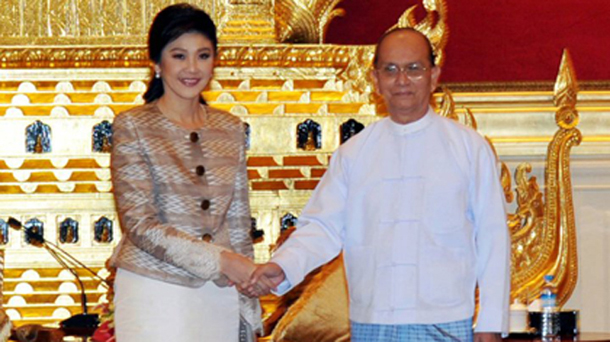The burning issue of the future of the Dawei (Tavoy) deep-sea port and industrial zone in southern Burma is due to be the main subject of discussion when Burmese President Thein Sein visits Thailand at the weekend.
Thein Sein will arrive in the Kingdom for three days on Sunday for a twice-postponed trip to Burma’s second biggest trading partner—bilateral trade with Thailand amounted to US 6.1 billion in 2011 and was only beaten by China.
“The development of the Dawei deep-sea port and industrial zone in Myanmar will be a major topic of discussion during the official visit of the Myanmar President,” said a statement issued by the Thai government.
In May, the Thai government approved a 33.1 billion baht ($1 billion) budget allocation for infrastructure to link with the Dawei megaproject. However, its future remains in doubt following the rejection by Naypyidaw of a coal-fired power plant in the area and one of the biggest investors, Max Myanmar Company, pulling out earlier this month.
The Dawei port complex, across the border from Thailand’s Kanchanaburi Province, is being developed by Thailand’s largest construction company Italian-Thai Development PLC. The $8.6 billion project was agreed with the former Burmese junta in 2008.
In order to aid bilateral economic development between the two countries, Thailand also will propose opening another border checkpoint in Kanchanaburi with an access road towards Dawei.
However, humanitarian groups have long voiced human rights concerns regarding the megaproject with particular reference to land seizures by the construction zone.
Other subject to be discussed include the 92 Thai citizens who were detained in Kawthaung Township, southern Burma, early last week for alleged illegal logging and illegally crossing the border. The Thai government will no doubt bring up the fate of those arrested with Thein Sein during his visit.
Meanwhile, Human Rights Watch (HRW) urged the Thai government in a letter on Thursday to use Thein Sein’s visit to press for immediate and concrete steps towards addressing serious human rights violations in Burma.
Prime Minister Yingluck should use Thailand’s leverage as one of Burma’s major political and economic partners and a core member of the Association of Southeast Asian Nations to help improve respect for human rights and promote political reform in the country, said the advocacy group.
“The Burmese government’s record on human rights remains poor, despite recent signs of change,” said Brad Adams, Asia director at HRW. “As a neighbor long affected by Burma’s abysmal rights record, the Thai government should not miss this opportunity to press Thein Sein to end army abuses against ethnic minorities and protect the basic rights of all people in Burma.”
Thein Sein was due to attend the World Economic Forum on East Asia in Bangkok from May 30 to June 1, but canceled his trip apparently after hearing opposition leader Aung San Suu Kyi was booked to address the event.
The former general also postponed a subsequent visit on June 4-5 ostensibly to tackle domestic crises including power shortage protests and sectarian violence in Arakan State, but rumors abounded that he was irked by the Nobel Laureate’s performance in the Kingdom.
















